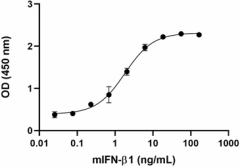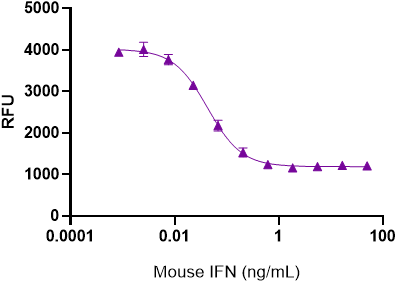- Regulatory Status
- RUO
- Other Names
- Interferon beta-1, Beta-interferon, IFB, interferon fibroblast, IFF
- Ave. Rating
- Submit a Review
- Product Citations
- publications

-

Mouse IFN-β1 induces the production of mouse CCL2 in RAW 264.7 mouse monocyte/macrophage cells in a dose-dependent manner. The ED50 for this effect is 0.9 – 4.5 ng/mL.
IFN-β1 is part of the type I IFN multigene family which includes at least eight subclases: IFN-α, IFN-β, IFN-ε, IFN-κ, IFN-ω, IFN-τ, IFN-δ, and IFN-ζ (limitin). Type I interferons (IFNs) (alpha/beta interferon [IFN-α/β]) are expressed as a first line of defense against viruses and play a critical role in the antiviral response. The antiviral activity of type I IFNs is exerted by different mechanisms, e.g. blockage of viral entry into the cell, control of viral transcription, cleavage of RNA, and preventing translation; therefore, type I IFNs block virus replication. In addition, type I INFs modulate the innate and adaptive immune responses. IFN-α/β induces natural killer cell cytotoxicity and expression of major histocompatibility complex class I on most cells and costimulatory molecules on antigen-presenting cells. Also, type I interferons act directly on CD8 T cells to allow clonal expansion and memory formation in response to viral infection.
Plasmacytoid dendritic cells (pDCs) produce high amounts of type I interferons (IFNs) and a variety of inflammatory cytokines and chemokines in response to viral infections. Mice deficient for IFN-β type I IFN receptor (IFNAR) have demonstrated an increased susceptibility to experimental autoimmune encephalomyelitis (EAE). Animal studies have shown that neutralization of IL-23 or the lack of IL-23 p19 gene expression completely ameliorated EAE. These data correlate with the fact that IFN-β has been used in the treatment of multiple sclerosis (MS) in humans, and it has been suggested that IFN-β inhibits human Th17 cell differentiation. It is known that Th17 cells play a central role in the immunopathogenesis of MS, and IL-23 plays a role in the expansion of differentiated TL17 cells in mice and differentiation of Th17 cells in humans.
Product Details
- Source
- Mouse INF-β1, amino acids Ile22-Apn182 (Accession# NM_010510.1) was expressed in 293E cells. The carboxi-terminal has a TG8HisGGQ-tag.
- Molecular Mass
- The 175 amino acid recombinant protein has a predicted molecular mass of approximately 21.2 kD. The DTT-reduced and non-reduced protein migrates at approximately 36 kD by SDS-PAGE. The N-terminal amino acid is Ile.
- Purity
- >98%, as determined by Coomassie stained SDS-PAGE.
- Formulation
- 0.22 µm filtered protein solution is in PBS.
- Endotoxin Level
- Less than 0.01 ng per µg cytokine as determined by the LAL method.
- Concentration
- 10 and 25 µg sizes are bottled at 200 µg/mL. 100 µg size and larger sizes are lot-specific and bottled at the concentration indicated on the vial. To obtain lot-specific concentration and expiration, please enter the lot number in our Certificate of Analysis online tool.
- Storage & Handling
- Unopened vial can be stored between 2°C and 8°C for up to 2 weeks, at -20°C for up to six months, or at -70°C or colder until the expiration date. For maximum results, quick spin vial prior to opening. The protein can be aliquoted and stored at -20°C or colder. Stock solutions can also be prepared at 50 - 100 µg/mL in appropriate sterile buffer, carrier protein such as 0.2 - 1% BSA or HSA can be added when preparing the stock solution. Aliquots can be stored between 2°C and 8°C for up to one week and stored at -20°C or colder for up to 3 months. Avoid repeated freeze/thaw cycles.
- Activity
- Mouse IFN-β1 induces the production of mouse CCL2 in RAW 264.7 mouse monocyte/macrophage cells in a dose-dependent manner. The ED50 for this effect is 0.9 – 4.5 ng/mL.
- Application
-
Bioassay
- Application Notes
-
BioLegend carrier-free recombinant proteins provided in liquid format are shipped on blue-ice. Our comparison testing data indicates that when handled and stored as recommended, the liquid format has equal or better stability and shelf-life compared to commercially available lyophilized proteins after reconstitution. Our liquid proteins are verified in-house to maintain activity after shipping on blue ice and are backed by our 100% satisfaction guarantee. If you have any concerns, contact us at tech@biolegend.com.
- Product Citations
-
Antigen Details
- Structure
- Cytokine
- Distribution
-
Macrophages, spleenocytes, fibroblasts, plasmacytoid dendritic cells, and osteoclast precursor cells.
- Function
- IFN-β induces an antiviral state. It is produced by virus-infected cells within hours and plays an important role in preventing virus spreading (antiviral effects). IFN-β activates natural killer cells and CD8+ T cell cytotoxicity, and induces the upregulation of genes required for antigen presentation and activation of adaptive immunity.
- Interaction
- T cells, dendritic cells, receptor genes for type I IFNs are ubiquitously expressed on all cells.
- Ligand/Receptor
- IFNAR1/IFNAR2
- Biology Area
- Apoptosis/Tumor Suppressors/Cell Death, Cell Biology, Signal Transduction
- Molecular Family
- Cytokines/Chemokines
- Antigen References
-
1. Kolumam GA, et al. 2005. J. Exp. Med. 202:637.
2. Chen Y, et al. 2006. J. Clin. Invest. 116:1317.
3. Li M, et al. 2009. J. Leukocyte Biol. 86:23.
4. Ramgolam VS, et al. 2009. J. Immunol. 183:5418.
5. Zhang X, et al. 2009. J. Immunol. 182:3928.
6. Sun M, et al. 2011. PLoS One 6:e19870.
7. Rodriguez C, et al. 2011. PLoS One 6:e28709. - Gene ID
- 15977 View all products for this Gene ID
- UniProt
- View information about IFN-beta1 on UniProt.org
Related Pages & Pathways
Pages
Related FAQs
- Why choose BioLegend recombinant proteins?
-
• Each lot of product is quality-tested for bioactivity as indicated on the data sheet.
• Greater than 95% Purity or higher, tested on every lot of product.
• 100% Satisfaction Guarantee for quality performance, stability, and consistency.
• Ready-to-use liquid format saves time and reduces challenges associated with reconstitution.
• Bulk and customization available. Contact us.
• Learn more about our Recombinant Proteins. - How does the activity of your recombinant proteins compare to competitors?
-
We quality control each and every lot of recombinant protein. Not only do we check its bioactivity, but we also compare it against other commercially available recombinant proteins. We make sure each recombinant protein’s activity is at least as good as or better than the competition’s. In order to provide you with the best possible product, we ensure that our testing process is rigorous and thorough. If you’re curious and eager to make the switch to BioLegend recombinants, contact your sales representative today!
- What is the specific activity or ED50 of my recombinant protein?
-
The specific activity range of the protein is indicated on the product datasheets. Because the exact activity values on a per unit basis can largely fluctuate depending on a number of factors, including the nature of the assay, cell density, age of cells/passage number, culture media used, and end user technique, the specific activity is best defined as a range and we guarantee the specific activity of all our lots will be within the range indicated on the datasheet. Please note this only applies to recombinants labeled for use in bioassays. ELISA standard recombinant proteins are not recommended for bioassay usage as they are not tested for these applications.
- Have your recombinants been tested for stability?
-
Our testing shows that the recombinant proteins are able to withstand room temperature for a week without losing activity. In addition the recombinant proteins were also found to withstand four cycles of freeze and thaw without losing activity.
- Does specific activity of a recombinant protein vary between lots?
-
Specific activity will vary for each lot and for the type of experiment that is done to validate it, but all passed lots will have activity within the established ED50 range for the product and we guarantee that our products will have lot-to-lot consistency. Please conduct an experiment-specific validation to find the optimal ED50 for your system.
- How do you convert activity as an ED50 in ng/ml to a specific activity in Units/mg?
-
Use formula Specific activity (Units/mg) = 10^6/ ED50 (ng/mL)
 Login / Register
Login / Register 












Follow Us